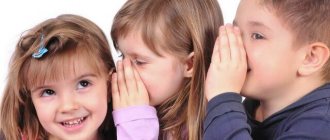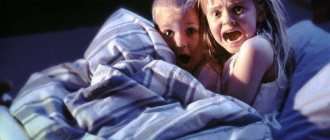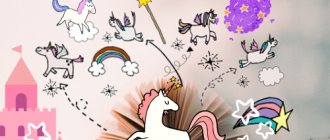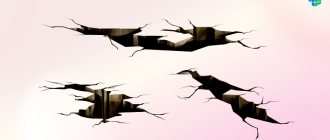Every society has certain standards of mental health, law, culture and morality. Social norms often suppress the instincts and desires of the individual. But if you want others to understand and accept you, you need to somehow meet these standards. For example, when you see a beautiful flower bed in bloom and follow social norms, you inhale the aroma and admire the flowers instead of picking them and taking them with you. Naturally, when raising your child, you try to accustom him to the same way of acting. And yet, even among respectable parents, the behavior of children sometimes goes beyond the norms prescribed by society. Psychologists call this behavior deviant, asocial, inadequate, and so on. What is the phenomenon of children with behavioral problems and how to deal with it?
Features of adolescence
From a psychological point of view, the age of transition from childhood to adulthood begins and ends individually. The child begins to strive for independence, wants to find his place in society, and sometimes even change his immediate environment. He begins to develop political sympathies - often they are opposite to his parents'. The views reveal categoricalness and intolerance—youthful maximalism. Behavior often becomes uncontrollable and aggressive.
During the transition period, romantic relationships arise. The child searches for his sexual identity and begins to be sexually active. He may try smoking, use alcohol or drugs, strives to make his own decisions and rejects everything that seems uncomfortable to him.
Inappropriate child behavior
The child’s inappropriate behavior is based on negative affective experiences associated with the dissatisfaction of needs that are important to him. When an assessment of one's abilities, based on the child's previous achievements, does not correspond to the current situation and one must admit one's inadequacy, some children experience affective experiences. Instead of overestimating their aspirations, children show an inadequate reaction to failure - increased sensitivity, stubbornness, isolation, emotional instability, inhibition, denial. For example, if in one school a child was successful in English and received praise from the teacher, then when he enters another school, where his achievements do not stand out from other students, he may begin to resent the teacher and believe that he is being treated unfairly. Inappropriate behavior of a child is a kind of defensive reaction designed to help in the event of a fiasco. In order not to lower self-esteem, the child begins to blame parents, teachers, immediate surroundings, circumstances, fate. Inappropriate behavior of a child causes responses from teachers and parents, which in turn intensifies affective experiences. The circle closes.
Antisocial behavior
Antisocial behavior is a persistent deviation from generally accepted norms. Forms of antisocial behavior in adolescents include emotional, behavioral and psychotic disorders, eating disorders, self-harm and suicide, substance use and risky sexual behavior. Vagrancy, gambling, foul language, lies, and hysterical attacks are possible. Source: T.T. Byazrova Social norm and social deviations in the behavior of minors // Current issues of modern science, 2010
Types of antisocial behavior
- Disapproved - occasional mischief and pranks.
- Condemned – causes systematic condemnation from adults.
- Deviant – immoral and immoral actions.
- Addictive – actions committed under the influence of alcohol and drugs.
- Delinquent – pre-criminal, administrative-delicate.
- Criminal – illegal, violation of legal requirements.
How to communicate with such people
Many people do not approve of an antisocial lifestyle, but this does not mean that such people should be treated rudely or disrespectfully. Such behavior will only cause a response wave of aggression. It's worth behaving:
- Do not enter into open disputes, conflicts, or showdowns. It's better to avoid sharp corners.
- Try to behave tactfully and politely, thereby providing a positive role model.
- If a person wants to change or asks for help, then it is worth advising him to see a psychologist, because the problem of asociality can be corrected even as an adult.
- It is most difficult when the antisocial person is a close relative. If you can’t establish contact with him, then the wisest thing to do would be to reduce communication to a minimum.
Causes of appearance in children
Biological. The prefrontal cortex, responsible for cognitive control, is just beginning to develop. Therefore, when making decisions, the brain uses the limbic system, which is responsible for the sphere of emotions. The actions of a teenager seem illogical to adults. In reality, a small person is simply not yet able to control emotional swings and the need for strong sensations. Source: A.I. Papkin Deviant behavior and psychological ways of its prevention // Bulletin of RUDN University, Ser. "Psychology and Pedagogy", 2007, No. 2, pp. 6-13
Social – the influence of the media and gender norms, the psychological climate in the family and the role among peers. Harsh parenting practices, sexual abuse, discrimination and social exclusion, bullying and socioeconomic problems increase the risk of antisocial behavior. Risk groups include orphans, members of minorities, teenagers who became parents early or entered into marriage, including forced marriage.
Pedagogical – educational strategy of parents and teachers (for example, hypo-custody or hyper-custody).
Psychological – attention deficit hyperreactivity disorder, neurological and somatoform disorders, autism spectrum disorders, mental retardation.
Your psychologist. The work of a psychologist at school.
“Psychological portrait of students with antisocial behavior” (message at a seminar by group curators)An important role in the prevention of illegal actions of adolescents and young men belongs to measures to identify and early prevent antisocial behavior at a “stage, relatively speaking, still remote from the commission of a crime” (G.A. Avanesov, 1980). Antisocial behavior is a complex phenomenon. When talking about antisocial behavior of minors, the concepts of deviant and delinquent behavior are often used as synonyms, which creates confusion. To overcome it, it is advisable to divide all social behavior into normal and deviant (deviating from the norm).
Deviation from the norm can be either positive (say, creative talent) or negative. Negative deviant behavior can be divided into immoral (a person commits actions that are contrary to moral standards), illegal or tortious (actions that are contrary to the rules of law, except criminal), and criminal or criminal (when a person violates the norms of criminal law). In foreign psychology, they avoid using the term “deviant behavior” and prefer to talk about problem behavior. Problem behavior is divided into internal (directed at oneself) and externalized (directed at others). Antisocial behavior then appears to be an extreme case of externalizing problem behavior. There are the following stages of development of antisocial behavior (Nevsky I.A., 1990):
- disapproved behavior (occasional pranks, mischief);
- negative behavior (associated with more systematic condemnation by caregivers);
- deviant behavior (morally negative manifestations and misconduct);
- delinquent (pre-criminal) behavior;
- criminal behavior;
- destructive behavior.
Such a staged consideration of the process of formation of antisocial behavior is quite traditional. However, the path to an offense or crime cannot always be so clearly and consistently traced. In addition, the influence of a teenager’s delinquency on his fate is ambiguous: numerous statistical data indicate that the average delinquency in most adolescents ceases with age. A promising approach is that of those sociologists and psychologists who try to consider antisocial behavior from the point of view of the young person himself. The study of the motivational and need sphere of students prone to antisocial behavior made it possible to identify the following needs (from strongest to weakest):
- The need for physical development is the desire to acquire vital physical qualities.
- The need for entertainment is the desire to have fun in your free time, to find something to do to your liking.
- The need for friendship is the desire to find real, responsive friends who can come to the rescue in difficult times.
- The need for emotional intimacy is the desire to find friends with whom you can share your innermost thoughts.
- The need for the opposite sex is the desire to enjoy popularity, attention and favor from people of the opposite sex.
- The need for autonomy is the desire to gain autonomy and independence.
- The need for comfort is the desire for favorable life support.
- The need for respect and support from peers.
- The need for prestige is the desire to gain popularity and attract attention.
The most striking distinctive feature of the motivational-need sphere of students with antisocial behavior is the need for physical development. The desire to consolidate and develop the necessary physical qualities pursues various goals. Most of them focus mainly on the “external effect”. Strength is especially valued among them. In addition to maintaining authority, these students use their physical condition as a shield: they protect themselves from the influence of peers and adults of equal physical development. This sense of security gives their actions a certain courage. In addition to the listed reasons for the predominance of this need over others, there is another one, when adolescents strive to compensate for their own shortcomings and failures in other activities. Numerous studies show that antisocial students spend most of their free time on entertainment. The range of these entertainments is unique and wide: from petty thefts, hooliganism, fights to the commission of socially dangerous and serious crimes. What is the reason for such aspirations? This is, first of all, the general level of culture of students with antisocial behavior, the poverty of their inner world. As a rule, they come from dysfunctional families and spend most of their time on the street. The entertainment that exists requires money. The dominance in the structure of needs of desires for emotionally rich personal relationships does not indicate an excess of close interpersonal contacts, but their deficit, that is, these students feel lonely, although sometimes they have a wide circle of acquaintances. The desire for emotional contacts in students with an antisocial orientation is one-sided. They want to turn their partner into a means of satisfying only their needs and do not strive to give or help their neighbors. This consumer attitude is very typical for the motivational-need sphere of students with an asocial orientation. The dominance of the need for the opposite sex is the desire of psychosexual attitudes and orientations of students with antisocial behavior. The desire to enjoy popularity, attention and favor with people of the opposite sex has a broad social meaning for students. As a rule, it contributes to the desire to assert oneself among peers. Students with antisocial behavior in most cases have psychosexual attitudes deformed towards primitiveness. This is influenced by the nature of sex education in the family, the moral and ethical values of a group of peers, and the specifics of education associated with the frequency of communication with people of the opposite sex. Data from teachers and psychologists show that the need for the opposite sex is significantly higher in educational groups homogeneous by sex than in mixed ones. A characteristic feature of the motivational-need sphere of students with antisocial behavior is the desire to acquire autonomy and independence. They have a very great desire to isolate themselves from any influences from others. This is most often a consequence of hypercontrol over all their life activities. To emphasize their difference from others, they develop their own style of behavior. From extravagance in clothing, foul language in public places, deliberately defiant addresses to elders to committing antisocial acts or offenses. By this they are trying to show the importance of their own “I”. Another fairly strong tendency that is typical for students with an antisocial orientation: the need for comfort. However, the desire for material well-being, the desire not to feel the need for fashionable clothes, money, video equipment, etc., is in no way supported by the desire to work and achieve high results in professional activities. Thus, the motives of students prone to antisocial behavior are of a consumer nature not only in the sphere of interpersonal relationships and communication, but also in the field of obtaining material benefits. Social passivity and apathy are the most pronounced feature characteristic of the majority of students with an antisocial orientation. The desire not to be responsible for anything, to share responsibility among all accomplices, to merge with the “gray” mass of the group, most likely, are the main motives for joining a company with a socially unacceptable orientation. The characteristic main individual traits of students with antisocial behavior are pronounced symptoms of neuroticism, psychoticism and depression. Neuroticism. Such students are characterized by an almost chronic feeling of anxiety, restlessness, timidity, a tendency to doubt, and extreme indecisiveness. Therefore, they often experience outbursts of an affective nature for insignificant reasons: reactions of anger, irritation and even aggression directed against peers, friends and people from their immediate environment. As a rule, students with neurotic reactions experience significant difficulties in adapting to new living conditions, study and work routines. The state of maladaptation leaves an imprint on the nature of students' behavior. In order to somehow avoid, to mask the feeling of discomfort that has arisen, such students resort to various methods of psychological defense. Some strive to follow with pedantic precision some invented routine known only to them. Strict adherence to pre-developed plans eliminates surprises and unforeseen contingencies, makes the course of events more predictable, which reduces the feeling of uncertainty and anxiety. Others try to resolve their difficulties by “going away” into illness. They very willingly play the role of a “sick” student; they will not fail to go to the clinic one more time for a certificate, have their teeth treated all day, etc. Such guys demand that they be left alone until they fully recover, not be given any instructions, and not make high demands. requirements for study and work results. Still others strive at all costs to achieve recognition from others and to attract attention. In order to appear more significant, they resort to various tricks, tricks and even self-sacrifice.
Psychoticism. Students with a psychotic personality are most characterized by constant internal conflict with themselves, constant tension and agitation, regardless of the degree of danger of the real situation. This tension in them, often without external reason, can manifest itself in unmotivated reactions of anger, rage, and fear. The main character traits of such students are selfishness, complacency and excessive conceit. These guys are one-sided: their attention is selective and directed only to the problems that interest them. Increased sensitivity to everything that affects their personality leads to a painful overestimation of both successes and failures. These students are characterized by strong emotional outbursts during any real or imaginary action in relation to their personality. They are extremely concerned about personal prestige; they perceive any criticism, remarks or simply indifference as an insult and insult, an encroachment on their freedom. They experience especially hostile feelings towards people who, to some extent, try to control their behavior. When trying to have a heart-to-heart talk, to “penetrate into their inner world,” they may be insolent, scold, or hit. Considering mainly other people to be the cause of their misfortunes, they are not only aggressive, vindictive and ruthless, but also strive for revenge and do not forgive anyone even the smallest trifle, any offense. They are not afraid to enter into conflict with parents, teachers, or law enforcement agencies. Depression. A distinctive feature of students prone to antisocial behavior is a melancholy mood, a depressed state, depression, reduced mental and motor activity, and somatic disorders. Gloominess, gloominess, isolation, absorption in one’s own thoughts and experiences is just a mask. Behind the external facade of aloofness and inaccessibility, as a rule, sensitivity, spiritual responsiveness, and constant readiness for self-sacrifice are hidden. Such students are characterized by weaker adaptation to situational events, all kinds of traumatic experiences, and chronic diseases. Any intense activity for them is difficult, unpleasant, proceeds with a feeling of excessive mental discomfort, quickly tires, and causes a feeling of complete powerlessness and exhaustion. Therefore, these guys are characterized by disobedience, laziness, poor academic performance, they are more pugnacious, and more often run away from home. Depressive disorders can be accompanied not only by low mood, feelings of guilt, anxiety, but also by ideas of self-blame, self-humiliation, suicidal thoughts (unwillingness to live) and actions. In order to somehow cheer up, get rid of melancholy and difficulties in communicating with others, students most often, not seeing other ways to combat depression, resort to the use of alcohol, drugs and toxic substances. In addition to the above-mentioned individual characteristics, students with antisocial behavior are also distinguished by some negative personality traits, such as irresponsibility, negligence, indifference, and selfishness. They often shirk their duties, ignore generally accepted rules, make no effort to comply with social requirements, and neglect moral values. Capable of dishonesty and lies for their own benefit. Antisocial behavior distinguishes students with a high degree of disinhibition, impulsiveness and poor self-control. Such boys and girls do not know how, and most often are simply not able to restrain and delay the satisfaction of their own desires. Many of them suffer from social infantilism, that is, striving to realize their needs immediately in direct behavior, they do not seriously think about the consequences of their actions, do not think about the social significance of their own aspirations. This is one of the main reasons that students with an antisocial orientation do not learn from their mistakes and do not benefit from their own negative experiences. Therefore, the lack of restraint and prudence leads many of them to various antisocial excesses (drunkenness, vagrancy, idleness, promiscuous sexual intercourse and venous diseases). Even the repressive measures taken against them do not bring the expected effect. The desires and drives of students with antisocial behavior are very strong, but at the same time extremely unstable. These guys strive for sharp and vivid experiences, sometimes they look for and find novelty and interest even in everyday affairs. However, they quickly become satiated and feel bored and irritable. Students with antisocial behavior (both boys and girls) are mainly characterized by masculine character traits. They are distinguished by great selectivity and a limited range of interests, enterprise, ease in communication and self-confidence, low emotional sensitivity and susceptibility to human suffering and troubles, assertiveness and aggressiveness. Such students are usually indulgent towards their weaknesses, not prone to introspection, love sensual pleasures, and prefer forceful methods of influencing people to all other methods of interaction. At the same time, students are prone to commit antisocial acts and often experience difficulties in interpersonal contacts and establishing relationships. As a rule, all their acquaintances are superficial and formal; only a very narrow circle of peers deserves their companionship. Thus, the described individual and personal characteristics of students with antisocial behavior are only a generalized psychological portrait.
Literature.
- Kon I.S. Psychology of early adolescence. – M.: Education, 1989.
- Features of educational work with pedagogically neglected students in secondary vocational schools: Method. rec. / Prepare M.A. Alemochkin, T.A. Morozova. – M.: 1986.
- Practical psychology of education / Under. ed. I.V. Dubrovina. M.: "Sphere", 1997.
- Psychological and pedagogical support of individual work to prevent antisocial behavior in vocational school students: Met. allowance. / Prepare L.A.Pergamenshchik, I.A.Furmanov, A.A.Aladiev, S.V.Otchik. – Mn.: 1991.
- Shumsky P.P., Ivanova L.N., Butsenko I.N. Workshop on educational psychology. – Mozyr: 1997.
Prevention of antisocial phenomena
It is in the interests of society to reduce the number of antisocial elements and correct their behavior. This social phenomenon creates a risk of increasing crime in the country, negatively affects the quality of life of the people, and reduces the level of health of the nation.
To avoid negative consequences, it is necessary to prevent these phenomena, especially among young people.
What can be done:
- promote a healthy lifestyle;
- make sports as accessible as possible to the population; holding sports festivals and competitions; attracting children and youth to sports clubs;
- anti-advertising of alcohol and tobacco products; social advertisement;
- enhanced social work with children and adolescents from disadvantaged families;
- organization of leisure time for youth (availability of creative clubs, motivation for activities)
- legal education (for young people to understand what offenses are punishable by what, and how this will affect their future lives).
How to get rid of asociality - practice
You can develop your own communication and social skills, you should start right now. You need to do the exercises daily, and write down your feelings, emotions, or even fears in a diary. This is necessary for regularity, increasing motivation and tracking your own success.
- Work on your self-esteem. Often antisocial people are not confident in themselves, so they avoid communication.
- Exercise “Share your smile.” Antisocial people rarely smile, joke, or act relaxed. Don't be afraid to do this. If you smile at people and make them smile back, then your relationships with them will develop better.
- Exercise "Compliment". A compliment will help make a person feel positive. It is important that the compliment emphasizes the person's achievements. This helps to create a good mood for both the person who said the kind words and the recipient.
- “Showing Interest” technique. It is common in society to be interested in others and to sincerely empathize with them. A simple question can start a conversation: “How did you get to work today?” or “How is your cat feeling? Is he feeling better now? It is desirable that interest in the affairs of another person be sincere.
- Give up negative thinking. For example, you shouldn’t despair and blame yourself for not being able to find many friends. It is better to think that everything is still ahead, and the situation can be corrected.
- Exercise “Give me three.” You can fight negative attitudes in an unusual way: for each negative attitude, come up with three positive ones. For example, “Nobody loves me, I’m a completely worthless person.” In contrast, the following would be suitable: “I have good traits and qualities,” “Soon I will have many friends,” and “I make a good impression.”
In your diary, write down what level you are at now and what you want to improve. Then write an action plan of what exercises and activities you will do. Share your plans and successes in the comments. This will help you reinforce the material and motivate other participants.
It is not always possible to work with asociality on your own. If there have been serious traumatic events in a person’s life (domestic violence, living in a dysfunctional family, loss of a loved one), then you should seek help from a psychologist.
Thanks for reading the article. Share in the comments what you think about antisocial personalities? Have you often noticed such traits in yourself or your loved ones?
Repost the article, it will certainly become useful for someone and help you cope with antisociality, love people and life.
Antisocial lifestyle
This is a way of life in which a person moves away from society and sets himself against it. This way of life implies destructive activity, and often self-destruction of the individual.
An antisocial lifestyle may be due to a person’s personal choice (vagrancy, drunkenness, criminal activity). Or arise due to mental, psychological disorders (when the subject is simply not able to control himself, cannot evaluate the correctness of his actions).









